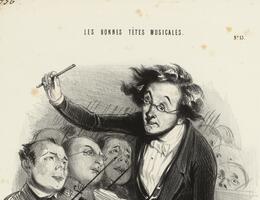
Philippe MUSARD
1792 - 1859
Conductor, Composer
The son of a musician who managed ballrooms, Philippe Musard doubtless received a basic musical training before following in his father’s footsteps. Arthur Pougin, in the supplement to Fétis’s Biographie universelle des musiciens (1880), describes Musard’s initial existence as a modest horn player and violinist performing at ballrooms on the outskirts of Paris during the Empire period. The turning point in his career came in 1815 on a visit to London, where he discovered the promenade concerts and began to make a name for himself in that lively milieu. He returned to Paris after the fall of the Bourbons (1830) and quickly became a key figure in Paris musical life under the July Monarchy. After the end of the 1832 cholera epidemic, the masked balls at the Opéra in 1833 were an event as eagerly looked forward to as they were exuberant: conducting them, Musard responded to the aspirations of the Parisians and embodied a certain renaissance of social life. Alongside the balls, he launched a series of large-scale daily concerts – derived from the London promenade concerts – and introduced his contemporaries to the sounds of a gigantic orchestra which he established initially in the Jardin Turc, then at the Salle Saint-Honoré and Salle Vivienne. A very talented arranger, he left more than 150 quadrilles composed on currently fashionable tunes or – more rarely – following his own inspiration. Loftier aesthetic ambitions are reflected in a set of three self-published string quartets, as well as a Nouvelle Méthode de composition musicale, begun in 1833 and dedicated to Antoine Reicha, but never completed.













